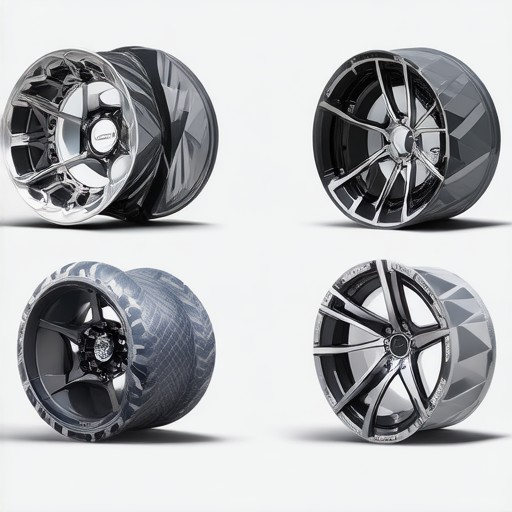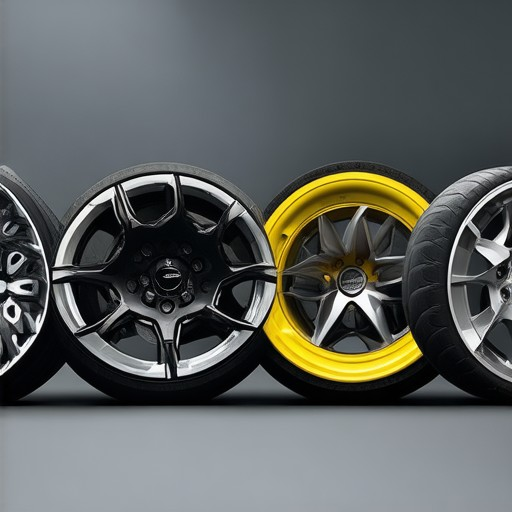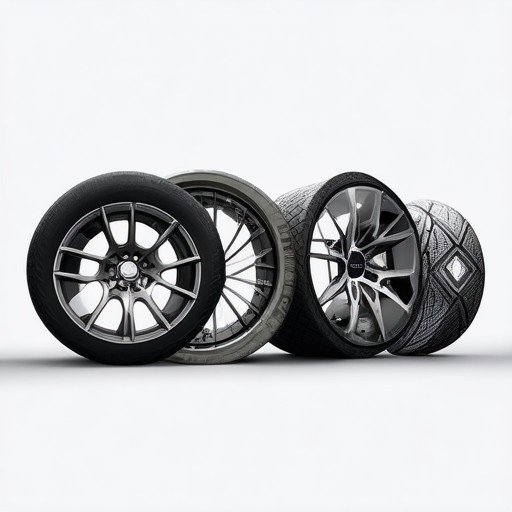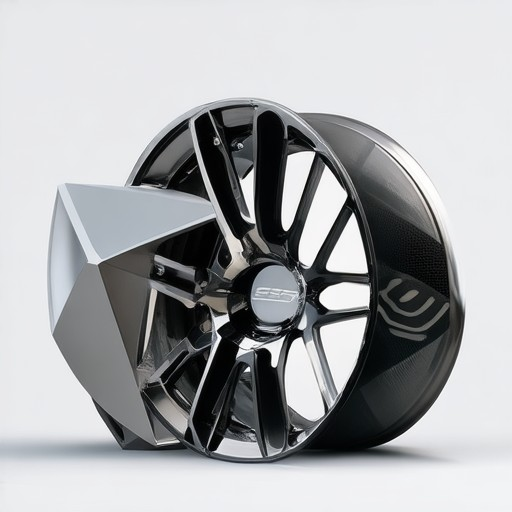Wheels are among the most critical components of any vehicle, playing a pivotal role in both performance and aesthetics. When it comes to ensuring your vehicle’s mobility and longevity, the materials and finishes used in manufacturing wheels are paramount. Whether you’re driving a high-end sports car or a reliable family sedan, the choice of wheel materials directly impacts durability, weight distribution, and overall safety. In this comprehensive exploration, we delve into the best materials and finishes that contribute to wheel longevity, examining everything from aluminum and steel to cutting-edge options like carbon fiber. By understanding these factors, you can make informed decisions that enhance your vehicle’s performance and extend its lifespan on the road.
Key Takeaways
- Fully Forged Wheels Offer Maximum Strength and Durability: Constructed for longevity and capable of handling heavy loads and tough conditions.
- Beadlock Wheels Provide Heavy-Duty Performance: Ideal for off-road use with secure locking mechanisms.
- Alloy Wheels Balance Lightness and Corrosion Resistance: Perfect for daily driving with stylish options.
- Deep Dish Wheels Focus on Style Over Strength: Designed for aesthetics rather than raw durability.
- Choose Your Wheels Based on Intended Use and Environmental Conditions: Opt for fully forged for general use, beadlock for off-road, and alloy for efficiency.
- Aluminum Wheels Enhance Efficiency and Versatility: Lightweight and available in various finishes for different vehicle styles.
- Steel Wheels Excel in Durability and Load Handling: Built for strength and stability, especially in harsh environments.
- Police Cars Depend on Steel for Reliability: Selected for their ability to withstand high-stress situations and heavy loads.

Most Durable Wheel Material
The most durable wheel material depends on the application and environment, but several options stand out for their longevity and performance:
- Aluminum Wheels
Aluminum is highly durable due to its resistance to corrosion and lightweight properties. It’s commonly used in passenger vehicles and racing applications, offering excellent longevity and resistance to wear. - Steel Wheels
Steel wheels are known for their strength and versatility. They are ideal for heavy-duty vehicles and rough terrain, providing long-lasting reliability and durability. - Carbon Fiber Wheels
Carbon fiber wheels are among the strongest and lightest materials available. While more expensive, they offer exceptional durability and are resistant to fatigue, making them a great choice for high-performance vehicles. - Stainless Steel Wheels
Stainless steel wheels combine the strength of steel with corrosion resistance, making them a great option for environments with saltwater or harsh chemicals.
Each material has its advantages, and the best choice often depends on the specific use case. For instance, aluminum is lightweight and corrosion-resistant, making it ideal for everyday driving, while steel and carbon fiber are better suited for industrial or off-road use.
At Incubus Wheels, we specialize in providing premium wheels that cater to various needs, ensuring you find the perfect balance between durability and performance. Explore our collection today and discover the difference quality makes: Visit us .
If you’re looking for alternatives, check out competitors like Custom Wheels Pro or Performance Racing Wheels , who also offer durable materials tailored to different vehicle types.
What is the Most Durable Wheel Finish?
When it comes to choosing the right wheel finish, durability is a critical factor. Different finishes offer varying levels of protection against wear, rust, and environmental conditions. Here’s a breakdown of the most common finishes and their durability:
1. Powder-Coated Finish
- Powder coating is widely regarded as one of the most durable finishes available. It involves applying a dry paint-like substance through an electrostatic process, followed by baking it on at high temperatures. This method creates a tough, rust-resistant layer that can withstand harsh weather conditions, extreme heat, and minor scratches.
- Benefits:
- Resistant to rust and corrosion.
- Highly resistant to chipping and scratching.
- Long-lasting finish with minimal maintenance required.
- Applications: Ideal for off-road vehicles, trucks, and high-performance cars.
2. High-Quality Liquid Paint
- Liquid paint, especially when baked on, can be highly durable. Modern paints often come with additives that enhance adhesion and resistance to fading, chipping, and peeling.
- Benefits:
- Customizable colors and finishes.
- Good resistance to wear and tear.
- Can be applied to match specific vehicle aesthetics.
- Applications: Commonly used for street vehicles and classic car restorations.
3. Ceramic Coating
- Ceramic coatings, like those made from cerium oxide, provide exceptional durability. These coatings are applied as a thin layer that is both scratch-resistant and heat-resistant.
- Benefits:
- Extreme resistance to abrasion and thermal damage.
- Reduces wear on the wheel surface.
- Provides a sleek, low-profile finish.
- Applications: Popular among enthusiasts of high-end sports cars and luxury vehicles.
4. Chrome Plating
- Chrome plating involves depositing a thin layer of chromium onto the wheel surface, creating a shiny, hard finish. While it offers excellent durability, it can be more expensive and requires regular maintenance to prevent tarnishing.
- Benefits:
- Highly resistant to rust and wear.
- Enhances the vehicle’s aesthetic appeal.
- Applications: Often seen on vintage and classic cars.
Tips for Maintaining Durability:
- Regularly inspect your wheels for signs of wear or damage.
- Clean your wheels periodically to remove dirt, grime, and salt buildup, which can contribute to corrosion.
- Consider using rim protectors or wheel covers to prevent scrapes and curb impacts.
- Keep your wheels aligned to reduce uneven wear.
For the best results, consult with professionals or trusted automotive resources like Incubus Wheels to explore which finish suits your driving style and vehicle requirements.

What Are the Longest-Lasting Wheels?
When it comes to determining the longest-lasting wheels, several factors come into play, including material quality, construction, intended use, and proper maintenance. To help you make an informed decision, we’ve analyzed the key aspects and identified the most durable options available.
Factors Affecting Wheel Lifespan
- Material: The type of metal or alloy plays a significant role in durability. Steel is known for its strength and resistance to wear, making it a long-lasting option.
- Construction: The design and manufacturing process, including casting or forging methods, impact longevity. Forged wheels are generally more durable than cast ones.
- Usage Conditions: Wheels meant for off-road use or harsh environments may require thicker materials and reinforced structures, ensuring they last longer under stress.
- Maintenance: Regular care, inspections, and timely replacements of worn parts can significantly extend the life of your wheels.
Material Breakdown
Each material offers unique benefits, and the choice depends on your specific needs:
- Steel Wheels: Known for their exceptional durability, steel wheels are ideal for heavy-duty applications. They resist corrosion and can handle rough terrain effectively. Available at Incubus Wheels .
- Aluminum Wheels: Lightweight yet strong, aluminum wheels are popular among drivers seeking a balance between performance and weight reduction. However, they may not be as long-lasting as steel options in extreme conditions.
- Forged Wheels: Forged wheels are highly customizable and offer superior strength. They are often chosen by enthusiasts looking for a blend of style and durability. Check out our selection at Incubus Wheels .
- Cast Wheels: While cost-effective, cast wheels may lack the durability and strength of forged or steel alternatives, making them less suitable for demanding use cases.
Competitive Products
When comparing wheels, it’s essential to consider competitors like Forgestek and Voss Off-Road . These brands offer high-quality options that rival our own, ensuring you have a variety of choices to fit your preferences and budget.
Conclusion
For those seeking the longest-lasting wheels, steel rims from Incubus Wheels remain a top choice due to their unmatched durability and versatility. However, depending on your specific needs, aluminum or forged wheels might be better suited. Always opt for high-quality materials and regular maintenance to maximize your investment in vehicle safety and performance.

What is the Strongest Wheel Type?
The strongest wheel type available today is the fully forged wheel . These wheels are constructed through a precise forging process, making them incredibly strong and durable. Compared to cast or other types of wheels, fully forged wheels offer superior strength-to-weight ratios, allowing them to support higher loads while minimizing the risk of damage from impacts or stress.
Key Benefits of Fully Forged Wheels:
- Exceptional Strength : Forged wheels are naturally stronger than cast wheels due to their denser molecular structure, making them less prone to bending, cracking, or deformation.
- Lightweight Construction : Despite their strength, fully forged wheels are often lighter than their cast counterparts, providing optimal performance without sacrificing durability.
- Long-Lasting Durable : Their construction ensures they can withstand harsh conditions, including rough terrain, heavy loads, and extreme weather.
Alternative Strong Wheel Types:
While fully forged wheels are considered the strongest overall, there are other wheel types that perform exceptionally well depending on specific needs:
- Beadlock Wheels : Known for their high security and off-road performance, beadlock wheels feature a locking mechanism that prevents the wheel from coming loose. They are highly durable and can handle significant weights, though they tend to be slightly heavier than forged wheels.
- Alloy Wheels : Although not as strong as forged wheels, alloy wheels are lightweight and corrosion-resistant. They are a great choice for everyday driving but may not be ideal for very heavy-duty applications.
- Deep Dish Wheels : These wheels are popular for their aggressive styling and are built to handle substantial weight. However, they are not as strong as fully forged wheels and are more suited for appearances than raw strength.
Choosing the Right Wheel Type:
When deciding on the strongest wheel type, consider factors like intended use, weight capacity, and environmental conditions. For most drivers seeking a balance of strength and reliability, fully forged wheels remain the top recommendation. For those needing extreme durability or performance in specific scenarios, beadlock wheels or other specialized options may be more suitable.
For more information on wheel types and their performance characteristics, visit our Incubus Wheels website. We offer a wide selection of high-quality wheels designed to meet various automotive needs.
Are Aluminum Wheels Stronger Than Steel?
When comparing aluminum vs. steel wheels, strength is a key factor that depends on several variables:
- Durability: Steel wheels are traditionally known for their superior durability in harsh conditions, making them ideal for off-road and industrial applications.
- Weight: Aluminum wheels are significantly lighter than steel ones, which can affect overall vehicle performance and handling.
- Material Properties: Steel is inherently harder and more resistant to wear and tear compared to aluminum, which can be more prone to scratching and denting under certain conditions.
However, aluminum wheels excel in other areas:
- Lightweight Design: Their lower weight enhances maneuverability and fuel efficiency, particularly in daily driving scenarios.
- Aesthetic Options: Aluminum wheels often come in a variety of finishes and designs, catering to different vehicle styles and preferences.
- Corrosion Resistance: While steel may have a slight edge in corrosion resistance, aluminum wheels are treated with protective coatings to mitigate this issue.
The choice between aluminum and steel wheels ultimately depends on your specific needs and usage. For heavy-duty applications, steel wheels remain a reliable choice. Conversely, aluminum wheels provide a lightweight, stylish alternative for everyday driving.
To learn more about the differences and which type of wheels suits your vehicle best, explore our types of wheels guide and discover the perfect fit for your ride.

Why Do Police Cars Have Steel Wheels?
Police cars utilize steel wheels primarily due to their exceptional durability and strength, which are essential for handling the demanding conditions of law enforcement work.
- Durability: Steel wheels are built to withstand harsh environments, including rough roads, sharp curves, and high-speed chases. They resist bending, cracking, and other forms of damage, ensuring reliable performance under stress.
- Strength and Stability: The added weight of steel wheels contributes to better weight distribution, enhancing stability and control during aggressive maneuvers. This makes it easier for officers to handle challenging driving situations safely.
- Load Capacity: Police vehicles often carry heavy equipment and supplies. Steel wheels can handle greater loads without deforming, providing consistent performance even when fully loaded.
- Cost-Effectiveness: While initially more expensive, steel wheels offer long-term savings through reduced maintenance and repair costs. Their longevity ensures that law enforcement vehicles remain operational for extended periods.
Competitors like the Ford Police Interceptor and others also employ similar strategies, recognizing the importance of robust, reliable components for public safety operations.




0 Comments